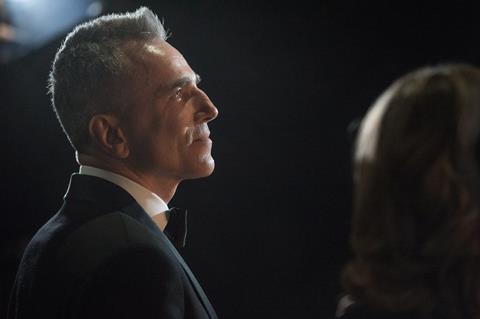Daniel Day-Lewis has championed the role of film critics in contemporary cinema, saying the critical response “matters hugely to us.” “You try an
Daniel Day-Lewis has championed the role of film critics in contemporary cinema, saying the critical response “matters hugely to us.”
“You try and wear a cap of defiance a little bit. It doesn’t fit that well,” said Day-Lewis in his Screen Talk at the 69th BFI London Film Festival, in a session hosted by critic and broadcaster Mark Kermode. “We made this film [Anemone]. We were ecstatic making it. We did what we could. We did our best.
“Of course, it matters hugely to us [how critics respond],” said Day-Lewis. “The critics, to some extent, do have the power to either encourage people to see it or discourage them from seeing it. That’s the middle men and women between us and the public.
“What we yearn for is that when our job is done, that it will be meaningful to people and if it proves not to be, it’s a very bad feeling.”
Anemone is the directorial debut of Daniel’s son Ronan Day-Lewis, who co-wrote the script with his father, who also stars in it.
Ronan joined his father on stage for the final 30 minutes of the 75-minute session. He offered his own perspective on critical response. “[Daniel] described it last night as like walking around without skin,” said Ronan. “That felt true to me. You care deeply because it’s something you poured so much of yourself into, especially when the film feels personal, which this one really does.
“It feels like a minor miracle that anything you felt strongly about, or felt an impulse to translate into that medium, means anything to anyone.”
Day-Lewis indicated a belief that cinema is not as accessible as it used to be as he discussed the origins of his career on the stage. “There’s still an elitism. Theatre is the superior form. Film? a bit dodgy. Television? Really?” said the actor, adding that despite that impression, he and many of his peers in the 1980s longed to work in film.
“The great thing about cinema is that everyone can buy a ticket, maybe not so much these days,” said Day-Lewis.
The actor also advocated for filmmakers leaning into work that engages them, as opposed to second-guessing the audience. “There’s an epidemic-proportion disease in cinema, trying to figure out how to get an audience to whoop and cheer,” said Day-Lewis. “We work in a more interior way – if it’s meaningful to us, maybe there’s a chance [it will be to others].”
Freeing
Day-Lewis regularly came back to his famed dedication in preparing for roles, often termed ‘method’ acting, whereby he lives as closely to the life of his character as he can while making a film.
“The commentary of the last few years about method acting is invariably from people who have little or no understanding of what it actually involves – like it’s some specious science, that we’re involved in a cult,” said the actor. “But it’s just a way of freeing yourself so that the spontaneity when you are working with your colleagues in front of the camera, that you are free to respond in any way that you’re moved to in that moment.”
“It’s not that you’re sealed off from experience. If you’ve done your work, you should be free to accept whatever passes through you.”
“It’s very easy to describe what I do as if I’m out of my mind. Plenty of people have been happy to do that,” said Day-Lewis. “But it just makes sense to me.”
Kermode introduced several clips from Day Lewis’s career throughout the Screen Talk session, including from My Left Foot, The Boxer, The Ballad Of Jack And Rose, Phantom Thread, and twice from Anemone.
Anemone follows a former soldier named Ray whose peaceful life is upended when his brother arrives with a letter addressed from Ray’s ex-girlfriend about their troubled son.
Daniel Day-Lewis stars alongside Sean Bean, Samantha Morton, Samuel Bottomley and Safia Oakley-Green.
The actor said he and Ronan were keen to push back against the idea that it isn’t “cool to show the British military experience, because they were the bad guys”.
“That’s not how it was,” said Day-Lewis. “Like anywhere in any conflict, there are young, working-class people pitched against each other, usually for no good reason.”
Day-Lewis also gave effusive praise to Ken Loach. “He is utterly unique, certainly in this country and probably the world, in having created a body of work behind which is a principle,” said the actor, who cited David Bradley in Loach’s 1969 feature Kes as the performance that inspired him to get into acting.
Anemone marks Daniel Day-Lewis’s first screen role in eight years, since 2017’s Phantom Thread and following his second career retirement.
Day-Lewis is one of only seven actors to have won three or more competitive acting Oscars; and is the only man to have won three Oscars for best actor, for My Left Foot in 1990, There Will Be Blood in 2008 and Lincoln in 2013.
Anemone had its world premiere at New York Film Festival in slow September before a US release on October 3 through Focus Features. It played at the BFI London Film Festival yesterday (Tuesday, October 14), and will be released in the UK & Ireland on November 7th through Universal. It is produced by Dede Gardner and Jeremy Kleiner for Plan B Entertainment.
The BFI London Film Festival runs until Sunday, October 19.

COMMENTS